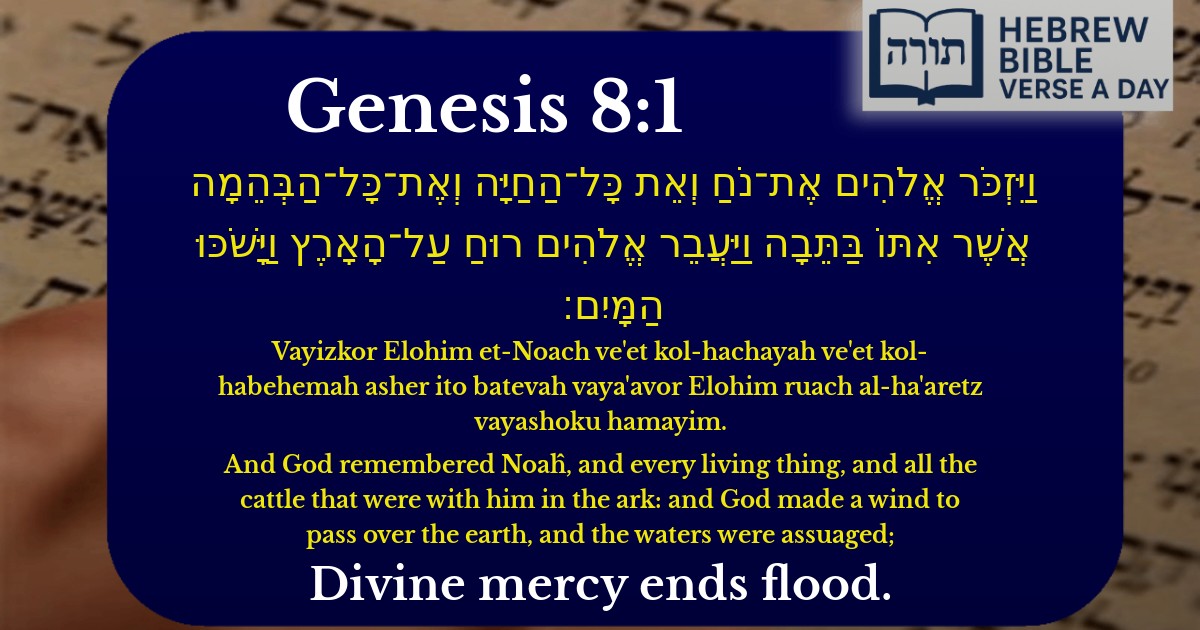Join Our Newsletter To Be Informed When New Videos Are Posted
Join the thousands of fellow Studends who rely on our videos to learn how to read the bible in Hebrew for free!
Hebrew Text
וַיִּזְכֹּר אֱלֹהִים אֶת־נֹחַ וְאֵת כָּל־הַחַיָּה וְאֶת־כָּל־הַבְּהֵמָה אֲשֶׁר אִתּוֹ בַּתֵּבָה וַיַּעֲבֵר אֱלֹהִים רוּחַ עַל־הָאָרֶץ וַיָּשֹׁכּוּ הַמָּיִם׃
English Translation
And God remembered Noaĥ, and every living thing, and all the cattle that were with him in the ark: and God made a wind to pass over the earth, and the waters were assuaged;
Transliteration
Vayizkor Elohim et-Noach ve'et kol-hachayah ve'et kol-habehemah asher ito batevah vaya'avor Elohim ruach al-ha'aretz vayashoku hamayim.
Hebrew Leining Text
וַיִּזְכֹּ֤ר אֱלֹהִים֙ אֶת־נֹ֔חַ וְאֵ֤ת כׇּל־הַֽחַיָּה֙ וְאֶת־כׇּל־הַבְּהֵמָ֔ה אֲשֶׁ֥ר אִתּ֖וֹ בַּתֵּבָ֑ה וַיַּעֲבֵ֨ר אֱלֹהִ֥ים ר֙וּחַ֙ עַל־הָאָ֔רֶץ וַיָּשֹׁ֖כּוּ הַמָּֽיִם׃
וַיִּזְכֹּ֤ר אֱלֹהִים֙ אֶת־נֹ֔חַ וְאֵ֤ת כׇּל־הַֽחַיָּה֙ וְאֶת־כׇּל־הַבְּהֵמָ֔ה אֲשֶׁ֥ר אִתּ֖וֹ בַּתֵּבָ֑ה וַיַּעֲבֵ֨ר אֱלֹהִ֥ים ר֙וּחַ֙ עַל־הָאָ֔רֶץ וַיָּשֹׁ֖כּוּ הַמָּֽיִם׃
🎵 Listen to leining
Parasha Commentary
📚 Talmud Citations
This verse is quoted in the Talmud.
📖 Rosh Hashanah 11b
The verse is referenced in the discussion about the timing of the flood and God's remembrance of Noah, illustrating divine providence and the cessation of the floodwaters.
📖 Zevachim 115b
The verse is cited in the context of discussing the sacrifices offered by Noah after exiting the ark, connecting God's remembrance of Noah to the subsequent offerings.


Divine Remembrance and Intervention
The phrase "וַיִּזְכֹּר אֱלֹהִים אֶת־נֹחַ" ("And God remembered Noah") does not imply that God had forgotten Noah, as the concept of forgetfulness does not apply to the Divine. Rather, as Rashi explains, this "remembrance" signifies that God turned His attention to Noah to bring about his salvation (Rashi on Bereishit 8:1). The Midrash Tanchuma (Noach 12) elaborates that this moment marks the beginning of divine mercy after the decree of the flood had been fulfilled.
Inclusion of All Creatures
The verse emphasizes that God remembered not only Noah but also "every living thing and all the cattle" in the ark. The Ramban (Nachmanides) notes that this demonstrates God's compassion extends to all creatures, not just humans (Ramban on Bereishit 8:1). The Talmud (Sanhedrin 108a) teaches that the preservation of the animals underscored the principle of tza'ar ba'alei chayim (avoiding unnecessary suffering to animals), as God ensured their survival alongside Noah.
The Role of the Wind
The phrase "וַיַּעֲבֵר אֱלֹהִים רוּחַ עַל־הָאָרֶץ" ("God made a wind to pass over the earth") is interpreted by the Sforno as a natural mechanism through which God began the process of drying the earth (Sforno on Bereishit 8:1). The Midrash (Bereishit Rabbah 33:7) compares this wind to the "wind of God" that hovered over the waters during Creation (Bereishit 1:2), suggesting a parallel between the renewal of the world after the flood and its initial creation.
The Subsiding of the Waters
The conclusion of the verse, "וַיָּשֹׁכּוּ הַמָּיִם" ("and the waters were assuaged"), is understood by the Malbim as a gradual process where the waters receded in an orderly manner, reflecting divine wisdom in restoring the earth (Malbim on Bereishit 8:1). The Zohar (1:69a) connects this to the idea of divine judgment being tempered with mercy, as the floodwaters—symbolizing strict justice—were now subdued to allow for renewal.